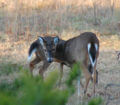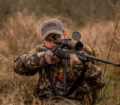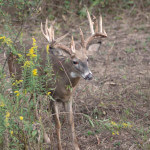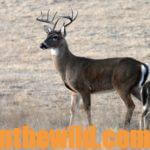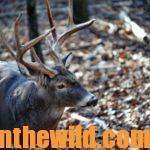Editor’s Note: Hunters can use much of the equipment they have at their homes to make hunting deer easier, including leaf blowers, shovels, backpacks, trail cameras, rakes, ATVs and flagging tape to name some. They also need to be aware of finding and taking big deer on small lands near their homes.
 Darrell Pennington of Vernon, Alabama, hunts on 24 acres his dad bought in 1990 just outside of town in Lamar County, Ala. Through the years, Pennington has scouted, planted green fields, fed deer and hunted there. Pennington’s family and friends average taking two bucks a year there, scoring between 120 and 130 on the Buckmasters Whitetail Trophy Records scoring system (http://buckmasters.com/Resources/BTR), although he did take one 140 buck. They also harvest three to five does every year. During the rut of the 2013-2014 deer season, Pennington saw a sight unlike any other in December. “I saw trees about the size of a man’s thigh that a buck had been scraping his antlers on, big deer tracks and very big deer droppings,” Pennington remembers.
Darrell Pennington of Vernon, Alabama, hunts on 24 acres his dad bought in 1990 just outside of town in Lamar County, Ala. Through the years, Pennington has scouted, planted green fields, fed deer and hunted there. Pennington’s family and friends average taking two bucks a year there, scoring between 120 and 130 on the Buckmasters Whitetail Trophy Records scoring system (http://buckmasters.com/Resources/BTR), although he did take one 140 buck. They also harvest three to five does every year. During the rut of the 2013-2014 deer season, Pennington saw a sight unlike any other in December. “I saw trees about the size of a man’s thigh that a buck had been scraping his antlers on, big deer tracks and very big deer droppings,” Pennington remembers.
Because Pennington didn’t use trail cameras, he didn’t have any pictures of the buck that was scarring-up his trees. The 24 acres his family owned were a wooded corridor that ran from a bottom up to the northeast to agricultural fields, including soybeans and corn and a dairy farm. South of a paved road from Pennington’s property was another family’s 60 – 100 acres that ran up against Yellow Creek and included a hardwood bottom deer also used as a travel corridor.
The deer came across the neighbors’ property to the Penningtons’ land to feed on the agriculture. On the eastern side of the Penningtons’ land was a large tract of uneven pine plantations, and the western side homed urban housing and hay fields. Across Yellow Creek was more than 1000 acres of pines that were hunted intensively by a hunting club. When hunting pressure built across the creek and the road, the deer moved on to the Penningtons’ tract for sanctuary and food.
A power line and a gas line right-of-way ran through the middle of the Penningtons’ 24 acres with a shooting house where hunters could see for 350 yards in any direction. Circling the entire 24 acres was a 4-wheeler trail that provided access to any part of the property where the Penningtons wanted to hunt.
 One night, Darrell Pennington told his dad, “I’m going to hunt early. Then about 8:30 am, I’ll come out of the woods and go to Jack’s Hamburgers for a hot breakfast that I’ll bring back to the house for you.” In this western section of Alabama, not far from the Mississippi state line, the peak of the rut usually occurs mid-January until the first of February. Pennington decided to go to his shooting house on the right-of-way and hoped to see a shooter buck chasing a doe. Then at 8:30 am, instead of walking directly to his father’s house after hunting, Pennington walked up a 4-wheeler trail to a plateau on the side of a hill where he’d planted a green field and also had found the scrape of what he believed to be a really-big buck.
One night, Darrell Pennington told his dad, “I’m going to hunt early. Then about 8:30 am, I’ll come out of the woods and go to Jack’s Hamburgers for a hot breakfast that I’ll bring back to the house for you.” In this western section of Alabama, not far from the Mississippi state line, the peak of the rut usually occurs mid-January until the first of February. Pennington decided to go to his shooting house on the right-of-way and hoped to see a shooter buck chasing a doe. Then at 8:30 am, instead of walking directly to his father’s house after hunting, Pennington walked up a 4-wheeler trail to a plateau on the side of a hill where he’d planted a green field and also had found the scrape of what he believed to be a really-big buck.
“I saw something move next to a beech tree just off the green field in the area where I’d seen the big scrapes,” Pennington recalls. “I froze like a statue. Then I could see one side of the deer’s rack and his hindquarters on the backside of the beech tree, about 35 yards from I’d stopped. But the rest of the body was hidden.” Pennington brought his rifle to his shoulder and carefully watched those big antlers. Expecting the buck to bolt and run away from him, Pennington was surprised to see the buck come around the beech tree and present a broadside shot. Pennington explains, “As soon as I saw the spot I wanted to hit behind the deer’s shoulder, I squeezed the trigger on my Ruger .270.”
At the report of the rifle, the 11 pointer dropped straight-down, out of Pennington’s sight. Because the hill was so steep, Pennington couldn’t see above the hill’s peak. Pennington didn’t hear the buck get up, thrash in the leaves or make any type of sound in the silent woods. Pennington put another shell in the chamber and brought his rifle to his shoulder, ready for a second shot. He waited as long as he could stand the anticipation. Due to the little time he’d had to evaluate the buck from when he first saw his antlers until he made the shot, he had no idea of the buck’s size. Pennington slowly crested the hill, walked down the hill and saw his buck on the ground.
 Although the buck scored 178-2/8, he only weighed about 180 pounds. However, his body was the size of a 200-pound buck. Pennington assumed that the buck probably had been chasing does night and day for 2 or 3 weeks during the rut. The story of Darrell Pennington’s buck raced through the Vernon area like wildfire. This January day was the first time Pennington ever had laid eyes on this buck. Pennington explains that, “One of the hunters who came to see the buck had trail-camera pictures of this buck for more than 3 or 4 years and told me he’d been hunting the buck religiously until the time I took him. The pictures I saw showed that the buck’s rack was actually bigger the year before. I believe our little 24 acres were like a sanctuary for that buck.”
Although the buck scored 178-2/8, he only weighed about 180 pounds. However, his body was the size of a 200-pound buck. Pennington assumed that the buck probably had been chasing does night and day for 2 or 3 weeks during the rut. The story of Darrell Pennington’s buck raced through the Vernon area like wildfire. This January day was the first time Pennington ever had laid eyes on this buck. Pennington explains that, “One of the hunters who came to see the buck had trail-camera pictures of this buck for more than 3 or 4 years and told me he’d been hunting the buck religiously until the time I took him. The pictures I saw showed that the buck’s rack was actually bigger the year before. I believe our little 24 acres were like a sanctuary for that buck.”
Deer hunters everywhere are beginning to see more big bucks taken from small properties that are well-managed and in the right locations.
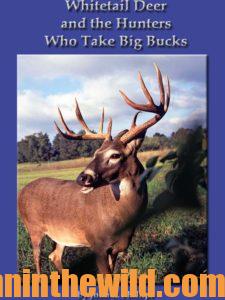
 To learn more about hunting deer on this land, go to John E. Phillips’s book, “Whitetail Deer and the Hunters Who Take Big Bucks” at https://www.amazon.com/Whitetail-Deer-Hunters-Take-Bucks-ebook/dp/B01KU0O1KY, available in Kindle and print versions.
To learn more about hunting deer on this land, go to John E. Phillips’s book, “Whitetail Deer and the Hunters Who Take Big Bucks” at https://www.amazon.com/Whitetail-Deer-Hunters-Take-Bucks-ebook/dp/B01KU0O1KY, available in Kindle and print versions.
To receive your free book on “How to Make Venison Jerky,” go to https://www.emailmeform.com/builder/form/Ece3UZVcOo52cKPJcL.

